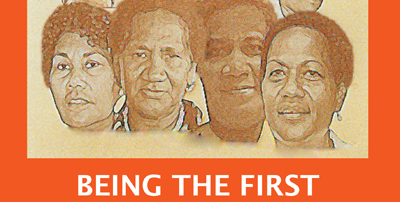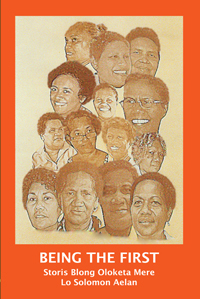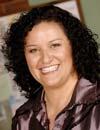
Sandra Kailahi
AUCKLAND: I am passionate about Pacific Island women so I decided to write a book about some of my favourite Pacific female role models making a difference in Aotearoa – Pasifika Women: Our Stories in New Zealand. So, when I was asked to review a book of a similar nature, but from the Solomon Islands, I was happy to oblige. Being the First – Storis Blong Oloketa Mere Lo Solomon Aelan profiles the stories of 14 outstanding women revealing their intimate moments, their struggles and the highs they’ve faced during their lives. I could relate to this brief because that’s exactly what I based my book on.
Being the First – Storis Blong Oloketa Mere Lo Solomon Aelan profiles the stories of 14 outstanding women revealing their intimate moments, their struggles and the highs they’ve faced during their lives. I could relate to this brief because that’s exactly what I based my book on.
The book states Solomon Islands women make up around 49 percent of the country’s population. Traditionally, these women are multi-taskers, the food producers, home keepers, child-bearers and child educators.
Thanks to this new book, we get to see them in a new light. We go in to a world of firsts – one where they hold positions of power and leadership in the public service.The 14 profiles include seven Permanent Secretaries, four Under Secretaries, a Member of Parliament, a Public Service Commissioner and the Clerk to Parliament. They each reveal interesting stories of their upbringing, the challenges along the way and the support they received from mentors, family and, in practically all profiles, their faith in God.
And then they give inspirational advice to young women wanting to follow similar paths.
However, as is most often the case with these types of stories, the rise of these women comes at a cost. It usually comes hand in hand with sexism, cultural conflict and challenge to ones beliefs and value system.
No women elected
And it is disappointing to see that in spite of these inspirational stories that it seems no women were elected to Parliament in last week’s national election.
The featured women’s first person accounts reveal a lot about them. The histories share a similar pattern, in that many grew up poor but they didn’t let that stop them. The question line is formulaic.
Most start with where and when they were born their schooling details and how they got into positions of power but seeing this is the first book of its kind; it’s easy to see why the editors went with this pattern.
In my experience, I have found Pacific women especially, older Pacific women don’t like talking about themselves. It’s not the done thing – your actions speak volumes but that doesn’t suit telling your life story so following a pattern enables the women to talk about their lives somewhat freely.
Professor Marilyn Waring, of the Institute of Public Policy at AUT University, co-edited the manuscript with Malaita-born Dr Alice Aruhe’eta Pollard. Suzanne Bent-Gina, deputy director of the Regional Assistance Mission to Solomon Islands’ (RAMSI) Machinery of Government programme, helped organise the book project as part of its component on women in government.
It pretty much is an all female affair. The interviews were conducted by the well-respected Catherine Adifaka (the first female Public Service Commissioner in Solomon Islands) and they were transcribed by Cynthia Wickham, a Solomon Islands marine science graduate.
The Pacific Media Centre’s Del Abcede designed the book and Isabella Rasch, also from AUT, created the cover montage.
General overview
At the start of the book is the chapter “Turning the Tide: celebrating women’s history in the Solomon Islands: 1948-2009”, written by Ruth Basi Asi-Maetala with Alice Pollard. This is great. It really helps provide the reader with a general overview of Solomon Island women in organisations like the Girl Guides, women’s clubs, women’s suffrage and participation in provincial and national elections, the public service and, of course, with church women.
Apparently there were no female public servants until 1963 then, almost 30 years later, Phyllis Taloikwai from Isabel became the first woman to reach the most senior position in the public service when she was appointed Permanent Secretary in 1992.
In fact, Phyllis Taloikwai was somewhat of a celebrity. She is practically mentioned by all the women profiled in the book as either being a role model or helping them in some way in their respective careers.
Unfortunately, Phyllis died well before the book was published but there’s no real mention of that or how or when she died. Her mother and husband wrote compelling tributes about the pioneer but you can’t help but feel the picture is not complete.
The honour of being the first female Member of Parliament in the Solomon Islands goes to Hilda Kari. Frustrated with unequal treatment at work, Kari ran for Parliament and was voted in for three consecutive elections.
“‘In 1988 I was very cross that here I am doing the same work as men but not being treated the same, and that was one of the reasons I went and said: Look, I’m going to go and stand for Parliament and prove to you that we can do it.”
She has been the only female Member of Parliament in the Solomon Islands since 1978.
Outspoken on culture
Ruth Liloqula was the first female Secretary to Cabinet and is now the Permanent Secretary of Lands, Housing and Survey. She is very outspoken about cultural attitudes towards gender roles.
“In our tradition women are equal, at least in mine. We are equal in freedom and recognition of who we are, what we can achieve, what we contribute today. It’s an acknowledged value. But in this formal system, I saw that women are discriminated against by males as well as expatriates – not all expatriates, but you could see that kind of thing. So I started to question.”
Pacific women are not just responsible for their immediate families. In the Solomon Islands obligations to the extended family play a major role in daily life.
Jane Waetara – The Permanent Secretary, Ministry of Development Planning and Aid Coordination since 2005 spoke about her feelings on this important tradition: “I tried my best to manage or find a balance between work and family needs and wants. Sometimes it is difficult and I have disappointed people, especially in the cultural setting where people think that, when they pay bride price, I am there to do everything for them because I have a paid job.”
Jane Waetara wrote about her challenge in being recognised for her hard work.
“I was probably one of the unfortunate ones who never got a promotion. I didn’t get much promotion until the mid 1990s, when I started to question my own ability or why I was never promoted. I began to form some opinions of my own……I started to doubt myself and my abilities as well. I tried to apply for transfer in the service as an option for promotion, but the service didn’t agree to a transfer for me.”
All the women acknowledged the support of their husbands, families and friends along the way and the influence of God in their lives and decisions.
Wonderful pioneers
The women in the book are wonderful pioneers but the selection process has come under fire and in one particular case, about the exclusion of one pioneer – Lily Ogatina Poznanski. Apparently, the Solomon Star received some letters criticising the omission of Lily Ogatina Poznanski who was elected to the Central Solomons seat in the
Legislative Council on 7 April 1965 – the first female elected
representative in the Solomon Islands.
She was also the first woman to be awarded an OBE and the Solomon Islands Independence medal. Lily passed away on 14 June 1989. She was briefly mentioned in the chapter, “Turning the Tide”. The reason for her omission was due to the lack of information the editors could gather on her from family members.
It’s not an easy process selecting women for a book like this. Inevitably, you will miss out someone who deserves to be included, thereby frustrating others but you can only choose a finite number.
Overall, Storis Blong Oloketa Mere Lo Solomon Aelan is an interesting read but I was left wondering about the ethnic tension from 1999 and how that really impacted on some of the women who are from Malaita.
Joy Kere made mention of being called into the peace process but didn’t elaborate. It would have been worthy of a more detailed mention to get their perspective on what happened and how it really affected them but I can see that this is still a sensitive issue and one the editors may not have wanted to explore further.
I would have also liked to have read about Solomon Island women in other areas like business, sport or non government agencies but seeing it is the first of its kind, hopefully it will lay the foundation for other books in the future. I look forward to that.
Being the First
• Catherine Adifaka (Malaita): first female Public Service Commissioner
• Betty Fakarii (Malaita): Under Secretary (Reconciliation and
Peace), Ministry of Unity
• Elizabeth Kausimae (West Are ‘Are, Malaita): Under Secretary, Ministry of Finance
• Emily Teaitala (Makira/Ulawa): Under Secretary (Correctional Services), Ministry of Police, National Security and Correctional Services
• Ethel Sigimanu (Fanalel, Malaita): Permanent Secretary to numerous departments
• Hilda Kari (Paupau, East Guadalcanal): MP (1989-2001) and Minister during the Billy Hilly and Ulufa’alu governments; she also helped
establish the National Council of Women
• Jane Waetara (Malu’u, North Malaita): Permanent Secretary, Ministry of Development Planning and Aid Coordination
• Joy Kere (Malaita): Permanent Secretary to various departments
• Mylyn Kuve (Roviana lagoon, Western): Permanent Secretary, Ministry of Education
• Nairy Alamu (Western): Permanent Secretary to numerous departments
• Nancy Legua (Ontong Java/Sikaiana): acting Under Secretary (Human Resources), Ministry of Public Service
• Phyllis Taloikwai (Isabel): first female Permanent Secretary
• Ruth Liloqula (Choiseul): Permanent Secretary to various departments
• Taesi Sanga (East Malaita): Clerk to Parliament - Pacific Scoop/Pacific Media Watch
Being the First: Storis Blong Oloketa Mere Lo Solomon Aelan, edited
by Alice Aruhe’eta Pollard and Marilyn Waring. NZ$25. Honiara: RAMSI, and
Auckland: Institute of Public Policy and the Pacific Media Centre, AUT
University.



